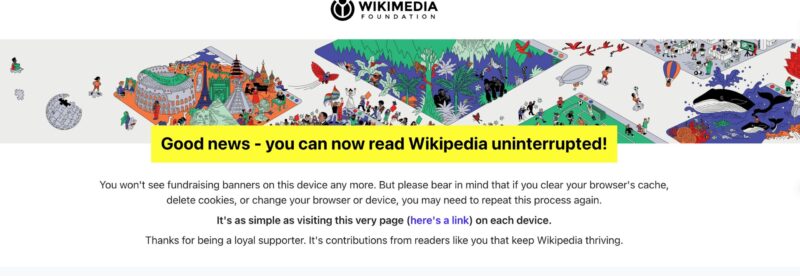A small step with outsized impact
Talk to donors and you quickly learn donor trust is not about your fancy logo or the tagline you agonized over for months. It’s the sum total of many small everyday interactions. Are you thanking them promptly for gifts? Is their name spelled right? Can they reach someone at your organization if they have a question or problem? Does your website have a mailing address and phone number on the home page?
We survey high-value donors every month and it’s always these little things that matter when they talk about their donor relationships. One thing we hear about often is donors’ annoyance when they visit your website only to confront a jungle of fundraising pop-ups, hijack screens and other persistent asks before they get to any content.
It’s a solvable problem. Wikimedia Foundation has shown the way. They now offer donors a one-click solution: A link that drops a cookie on your website that tells the Wikipedia site to omit fundraising banners.

If they can do it, you can do it.
Whatever small amount of money you might raise from existing donors will be more than offset by the trust you lose by cluttering your site with asks. This is especially true for midlevel donors, who are giving you thousands of dollars a year already and resent the feeling of being nickeled and dimed.
It’s ironic and as a fundraising consultant, it’s frustrating: Organizations will spend hundreds of thousands of dollars on branding, on website redesigns, name changes and other vanity projects but will scrimp on the things donors really care about. This is just one example.
No excuses. Follow Wikimedia’s lead. You’ll be glad you did.
